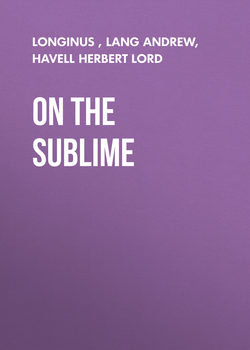On the Sublime

Реклама. ООО «ЛитРес», ИНН: 7719571260.
Оглавление
Lang Andrew. On the Sublime
TRANSLATOR’S PREFACE
ANALYSIS
INTRODUCTION
I
II
III
IV
V
VI
VII
VIII
IX
X
XI
XII
XIII
XIV
XV
XVI
XVII
XVIII
XIX
XX
XXI
XXII
XXIII
XXIV
XXV
XXVI
XXVII
XXVIII
XXIX
XXX
XXXI
XXXII
XXXIII
XXXIV
XXXV
XXXVI
XXXVII
XXXVIII
XXXIX
XL
XLI
XLII
XLIII
XLIV
NOTES ON LONGINUS
APPENDIX
Отрывок из книги
The Treatise on the Sublime may be divided into six Parts, as follows: —
I. – cc. i, ii. The Work of Caecilius. Definition of the Sublime. Whether Sublimity falls within the rules of Art.
.....
As a literary critic of Homer our author is most interesting even in his errors. He compares the poet of the Odyssey to the sunset: the Iliad is noonday work, the Odyssey is touched with the glow of evening – the softness and the shadows. “Old age naturally leans,” like childhood, “towards the fabulous.” The tide has flowed back, and left dim bulks of things on the long shadowy sands. Yet he makes an exception, oddly enough, in favour of the story of the Cyclops, which really is the most fabulous and crude of the fairy tales in the first and greatest of romances. The Slaying of the Wooers, that admirable fight, worthy of a saga, he thinks too improbable, and one of the “trifles into which second childhood is apt to be betrayed.” He fancies that the aged Homer had “lost his power of depicting the passions”; in fact, he is hardly a competent or sympathetic critic of the Odyssey. Perhaps he had lived among Romans till he lost his sense of humour; perhaps he never had any to lose. On the other hand, he preserved for us that inestimable and not to be translated fragment of Sappho – φαίνεταί μοι κῆνος ἴσος θεοῖσιν.
It is curious to find him contrasting Apollonius Rhodius as faultless, with Homer as great but faulty. The “faultlessness” of Apollonius is not his merit, for he is often tedious, and he has little skill in selection; moreover, he is deliberately antiquarian, if not pedantic. His true merit is in his original and, as we think, modern telling of a love tale – pure, passionate, and tender, the first in known literature. Medea is often sublime, and always touching. But it is not on these merits that our author lingers; he loves only the highest literature, and, though he finds spots on the sun and faults in Homer, he condones them as oversights passed in the poet’s “contempt of little things.”
.....